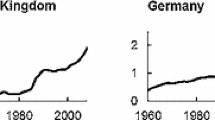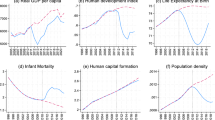Abstract
The growth model (GM) programme in comparative and international political economy attempts to do three things. First, it encourages a dialogue between international and comparative political economy research through creating a shared theoretical framework that moves beyond the methodological and ontological nationalism of traditional comparative research. Second, it draws upon post-Keynesian macroeconomics to emphasise the importance of domestic demand, credit debt, and macro-financial regimes in shaping the politics of advanced capitalism. Third, it draws attention to the dynamics of political conflict, coalition building and social agency in shaping country-specific GMs. Each paper in this special issue either directly or indirectly touches on these different aspects of the nascent GM research programme. But they do so with a particular focus on the comparative political economy of Europe.
Similar content being viewed by others
References
Baccaro, L., and J. Pontusson. 2022. Rethinking comparative political economy: the growth model perspective.Politics & society 44 (2): 175–207.
Baccaro, L., and J. Pontusson. 2022. The politics of growth models. Review of Keynesian Economics 10 (2): 204–221.
Baccaro, L., M. Blyth, and J. Pontusson. 2022. Diminishing returns: The new politics of growth and stagnation. Oxford: Oxford University Press.
Behringer, J., and T. van Treeck. 2022. Varieties of capitalism and growth regimes: The role of income distribution. Socio-Economic Review 20 (3): 1249–1286.
Bohle, D., and A. Regan. 2021. The comparative political economy of growth models: Explaining the continuity of FDI-led growth in Ireland and Hungary. Politics & Society 49 (1): 75–106. https://doi.org/10.1177/0032329220985723.
Bohle, D., and A. Regan. 2022. Global capital and national growth models: The case of Ireland and Latvia. In Diminishing returns: The new politics of growth and stagnation, ed. L. Baccaro, M. Blyth, and J. Pontusson, 351–374. Oxford: Oxford University Press.
Haffert, L., and D. Mertens. 2021. Between distribution and allocation: Growth models, sectoral coalitions and the politics of taxation revisited. Socio-Economic Review 19 (2): 487–510.
Hassel, A., and B. Palier. 2021. Growth and welfare in advanced capitalist economies: How have growth regimes evolved? Oxford: Oxford University Press.
Hassel, Anke, and Bruno Palier. 2023. Same trend, different paths: Growth and welfare regimes across time and space. Annual Review of Political Science 26
Hein, E., W.P. Meloni, and P. Tridico. 2021. Welfare models and demand-led growth regimes before and after the financial and economic crisis. Review of International Political Economy 28 (5): 1196–1223.
Johnston, A., and M. Matthijs. (2022) The political economy of the Eurozone’s post-crisis growth model. In: Baccaro L, Blyth M and Pontusson J (eds), Diminishing Returns. The New Politics of Growth and Stagnation (p. Chapter 4). New York: Oxford University Press.
Kohler, K., and E. Stockhammer. 2022. Growing differently? Financial cycles, austerity, and competitiveness in growth models since the Global Financial Crisis. Review of International Political Economy 29 (4): 1314–1341.
Nölke, A. 2023. Building blocks for a recombination of comparative and international political economy. In Second image IPE: bridging the gap between comparative and international political economy, 23–47. Cham: Springer.
Schedelik, M., A. Nölke, D. Mertens, and C. May. 2021. Comparative capitalism, growth models and emerging markets: The development of the field. New Political Economy 26 (4): 514–526. https://doi.org/10.1080/13563467.2020.1807487.
Stockhammer, E. 2022. Post-Keynesian macroeconomic foundations for comparative political economy. Politics & Society 50 (1): 156–187.
Author information
Authors and Affiliations
Corresponding author
Additional information
Publisher's Note
Springer Nature remains neutral with regard to jurisdictional claims in published maps and institutional affiliations.
Rights and permissions
Springer Nature or its licensor (e.g. a society or other partner) holds exclusive rights to this article under a publishing agreement with the author(s) or other rightsholder(s); author self-archiving of the accepted manuscript version of this article is solely governed by the terms of such publishing agreement and applicable law.
About this article
Cite this article
Regan, A. Growth models and the comparative political economy of Europe. Comp Eur Polit 22, 1–4 (2024). https://doi.org/10.1057/s41295-023-00372-2
Accepted:
Published:
Issue Date:
DOI: https://doi.org/10.1057/s41295-023-00372-2




